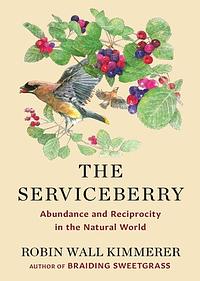You need to sign in or sign up before continuing.
Take a photo of a barcode or cover
6.38k reviews for:
The Serviceberry: Abundance and Reciprocity in the Natural World
Robin Wall Kimmerer
6.38k reviews for:
The Serviceberry: Abundance and Reciprocity in the Natural World
Robin Wall Kimmerer
Kimmerer expands on a few of the concepts she explores in Braiding Sweetgrass, namely the honorable harvest and a gift economy. Those were some of my favorite topics in BS and I really enjoyed this follow-up. I might re-read the book on paper, because while I really enjoyed hearing Kimmerer's calming narration of the essay, I felt I might have missed some things as I was doing my chores, etc. and listening. Those interested in Kimmerer's work will find this a good introduction to her style before you dive into something much heartier like BS, and those who loved BS like I did, will also likely enjoy this short book.
hopeful
reflective
fast-paced
informative
inspiring
medium-paced
Amazingly written (and narrated). I actually wished it were longer! I would definitely recommend this.
hopeful
informative
inspiring
fast-paced
emotional
informative
inspiring
reflective
medium-paced
hopeful
informative
inspiring
fast-paced
hopeful
informative
inspiring
reflective
medium-paced
hopeful
informative
inspiring
reflective
fast-paced
emotional
hopeful
informative
inspiring
reflective
fast-paced
adventurous
reflective
medium-paced
There is something immensely comforting in Kimmerer's writing style. She weaves sensory accounts of her own gathering with more abstract ideas. In the great traditions of nature writing, berries pop with colour and you can almost taste the tang (I actually have no idea what a serviceberry taste likes, but I felt like I did). Reading these passages transports you to a relationship we often forget exists, and that transportation makes the ideas she promotes feel less far away. Kimmerer argues that we can rethink of our economies along Indigenous lines, using frameworks geared towards exchange and reciprocity too replace those which encourage accumulation. I find the articulation of a Potawatomi perspective more compelling than her tentatively suggested next steps, but the book is a welcome balm.





